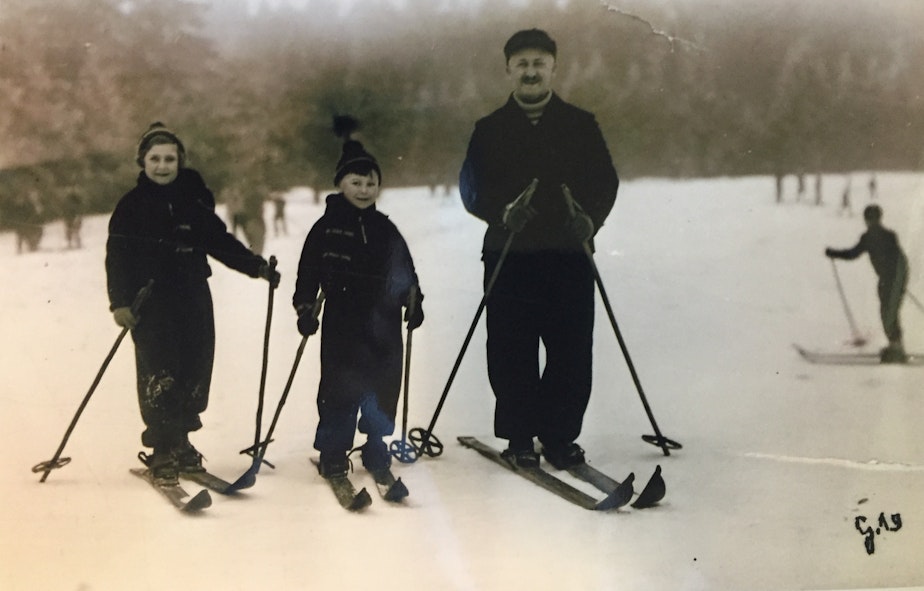How my 90-year-old neighbor, a Holocaust survivor, sees America today

One of the world's biggest cities was once a safe haven for Jewish refugees. During World War II, more than 18,000 Jews sought refuge in Shanghai. They witnessed the war from a perspective that often goes unheard.
My neighbor Werner Glass is one of them.
I sat with him as he showed me childhood photos in his home on Mercer Island.
Werner went through so much to get to the United States, and he's happy to be here. But he worries about the future.
"I see signs that don't make me very happy," he said. "About a lack of interest in government.
"Growing up the way I did, I certainly know what a bad government can do to a country, to a people, to one's life."

Werner was born in 1927 in Berlin. His father was a pediatrician, and his mother helped keep the books.
In 1933, Hitler came to power. Werner's parents wanted to leave Germany as quickly as possible.
"So we went to Shanghai because there was nowhere else to go," Werner told me.
They took a train to Switzerland. From there, they made their way to Italy, and finally found a boat to Shanghai.
"If you got off the ship in Shanghai, you were there," he said. "Nobody cared who came and left. On the other hand, of course, nobody cared if you starved or got sick."
Werner and his family settled in Shanghai. It wasn't long until war reached Shanghai, too.
Meanwhile, in Germany, Hitler gained power and anti-Semitism spread. In November 1938, Nazi actions turned violent, destroying Jewish businesses and killing nearly 100 Jews in one night, known as the Night of Broken Glass or Kristallnacht.
After that night, more Jews fled Germany, and eventually there were 18,000 Jewish refugees in Shanghai alone.
Around the same time, Werner's family was thrown out of their apartment and needed a place to live. But Shanghai was crowded.
"We had a hard time finding a place to live," he said. "We finally found one in a licensed private hotel which was actually a brothel."
The brothel was in a three-story house.
"The bottom floor were all Chinese girls," he said. "On the third floor, there were all Russian girls.
"On the second floor, it turned out, were all people who had been thrown out of their apartments by the Japanese and couldn't find any other place to live."
Living in the brothel was not ideal. Werner's family ate a lot of rice, eggs, and cabbage, but there wasn't much meat.
"Once a week, we took a bath," he said. "I always went first, then my sister, then my mother, then my father, in the order of age. My sister used to claim it was unfair that I went first because she said I was the dirtiest."

"We survived," he said. "You can survive an awful lot of things when you have no choice."
Meanwhile, the war was escalating. Werner told me that when the United States started bombing Shanghai, there were no air raid shelters.
"You just hoped you got out of the streets. Hoped you wouldn't get hit. But people did get hit."
"It was scary," he said. "But what can you do but sit there? You have no control."
In 1945, the war came to an end. Werner's sister left to go to America with her husband. Werner was eager to follow suit, so he went to the United Nations Relief and Rehabilitation Administration office to get his documents.
The man sitting behind the desk at the UN was an Englishman who had been visiting one of the girls at the brothel where Werner lived.
"He looked at me, and I looked at him, and he obviously wanted me to get the hell out of there real fast," he said.
Werner was given his documents almost immediately. Everyone was surprised because you usually had to wait. With his documents in hand, he boarded a boat and made his way to the United States. He went on to become a student at Syracuse University, and later studied chemical engineering at MIT and education at Harvard.
Now Werner lives a block away from me. He has been married to his wife Lois for 66 years. He has children and grandchildren of his own.
He is also an active member of the Herzl-Ner Tamid Synagogue on Mercer Island.
As Werner reflects on his life experiences, he urges people to be informed about what's going on in their country and to understand how politics relates to their everyday lives.
"People are so self-centered," he said, continuing our earlier conversation. "They really don't care what kind of government they have because they don't realize what a bad government can do to a country.
"I hope people will learn their lesson someday before it's too late."
This story was created in KUOW's RadioActive Intro to Journalism Workshop for 15- to 18-year-olds at Jack Straw Cultural Center, with production support from Ann Kane. Edited by Jill Jackson.
Find RadioActive on Facebook, Twitter and Instagram, and on the RadioActive podcast.



